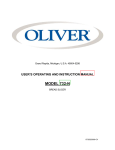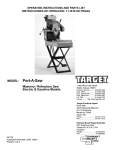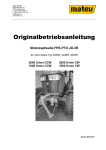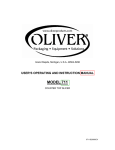Download Marley Engineered Products 3638R Operating instructions
Transcript
READ & SAVE THESE INSTRUCTIONS MODELS 2438, 3038R & 3638R WHOLE HOUSE VENTILATORS CEILING INSTALLATION ONLY NOTE: MODELS 3038R AND 3638R ARE AVAILABLE FOR CEILING AND WALL INSTALLATION. HOT AIR OUT HOT AIR OUT COOL AIR IN COOL AIR IN WARNING: TO REDUCE THE RISK OF FIRE OR ELECTRIC SHOCK, DO NOT USE THIS FAN WITH ANY SOLID-STATE SPEED CONTROL DEVICE. INTRODUCTION Your Whole House Ventilator is designed and engineered to provide years of satisfactory service in cooling and ventilating your entire house. Hot, humid air is drawn from the living areas and replaced by cooler outside air. This cooler air may be routed through selected areas of the house by opening the proper windows and doors. A 3-speed control is supplied. A 12-hour timer, Model 1012A, is also available as an accessory. The recommended method of installation for 16” O.C. joist construction with the 30” Whole House fan, Model 3038R, (see pp. 3, 4, 5 & 6) completely eliminates all framing and cutting of ceiling joists, thus providing the easiest installation available. The shutter for this installation is also designed to give an attractive flush appearance without cutting the center joist. LEAVE THIS MANUAL WITH HOMEOWNER. IMPORTANT SAFETY INSTRUCTIONS WARNING: TO REDUCE THE RISK OF FIRE, ELECTRICAL SHOCK OR INJURY TO PERSONS, OBSERVE THE FOLLOWING: 1. Do not use this fan with any Solid-State Speed Control Device. 2. Use this unit only in the manner intended by the manufacturer. If you have questions, contact the manufacturer. 3. Before servicing or cleaning this unit, switch power off at service panel and lock service panel to prevent power from being switched on accidentally. 4. Installation work and electrical wiring must be done by qualified person(s) in accordance with all applicable codes and standards, including fire-rated construction. 5. Sufficient air is needed for proper combustion and exhausting of gases through flue (chimney) of fuel burning equipment to prevent back drafting. Follow the heating equipment manufacturer’s guideline and safety standards such as those published by the National Fire Protection Association (NFPA), and the American Society for Heating Refrigeration and Air Conditioning Engineers (ASHRAE), and the local code authorities. 6. CAUTION: For general ventilation use only! Do not use to exhaust hazardous or explosive materials and vapors. 7. When cutting or drilling into wall or ceiling, Do Not damage electrical wiring or other hidden utilities. 8. CAUTION: This unit has an unguarded impeller. Do not use in locations readily accessible to people or animals. TOOLS AND MATERIALS REQUIRED Tape Measure Saber or Circular Saw Electrical Connectors & Supplies as required 2 x 6 and/or 2 x 4 Wood Framing Materials are required 2 x 2 Furring Strips as required Shutter - See text under Specific Installation for proper shutter Power Tools should display the U.L. Listing Mark Screw Driver Electric hand Drill Hammer & Nails ADDITIONAL MATERIALS REQUIRED FOR WALL INSTALLATION ONLY 3/4” Plywood as required. Wood Screws, Bolts, Nuts, Washers, Lock Washers as required. Door Case Molding or Equivalent CAUTION: CUTTING ROOF TRUSS IS NOT RECOMMENDED. SHUTTERS TO BE USED FAN MODEL SHUTTER 2438 3038R 3038R 3638R 3038R 3638R 3224 3230 A3024 3236 3130 3136 TYPE OF OPENING FOR OVERALL SIZE INSTALLATION SHUTTER OF SHUTTER HORIZONTAL HORIZONTAL HORIZONTAL HORIZONTAL VERTICAL VERTICAL 24” x 24” 30” X 30” 301⁄2” X 331⁄2” 36” X 36” 30” X 30” 36” X 36” 26” x 26” 32” X 32” 32” X 36” 38” X 38” 331⁄8” X 331⁄8” 391⁄4” X 391⁄4” FINISH CUT CEILING JOIST WHITE WHITE WHITE WHITE ALUMINUM ALUMINUM YES YES NO YES N/A N/A BE CAREFUL! USE PROTECTIVE GLASSES AND FOLLOW ALL SAFETY RULES. 1 ATTIC AIR INTAKE AND DISCHARGE Your Whole House Ventilator will be discharging a large volume of air into the attic every minute. Provisions must be made to allow this air to escape to the outside. The sketches below illustrate several different types of exhaust vents that are in common usage. Of these types, the under-eave and gable methods are the most prevalent. Under-eave is probably the most satisfactory from the standpoint of simplicity and economical installation. Make sure under-eave vents are not blocked with ceiling insulation. The fan requires a given amount of exhaust outlet in order to ensure quiet operation and unrestricted air movement. The table below shows the minimum area required for proper operation of fan. Sufficient ventilation is very important. Unless enough is provided, the fan motor will run hot, activating the thermal protector and shutting off the motor. When it cools, it will restart. Such intermittent operation is usually an indication of too little outlet air or too little intake air through the house. MINIMUM ATTIC DISCHARGE AREAS REQUIRED (All areas are in square feet) FAN SIZE UNRESTRICTED* WOOD LOUVRE* METAL LOUVRE* SHUTTERS OPENING REQD. OPENING REQD. OPENING REQD. AUTO. MAN. ETC. 24” 30” 36” 6.5 9.2 12 14.7 20.7 27 11.4 16 21 4 6.3 9 *If fly screen is used, double these values. If 1/2” hardware cloth or large mesh expanded metal are used, the values given are sufficiently large. If no screen used, reduce values shown by 20%. B (Ft.) B (Ft.) A (Ft.) A (Ft.) (1/2 A X B = AREA Sq. Ft.) GABLE EXHAUST (A X B = AREA Sq. Ft.) EAVE EXHAUST B (Ft.) A (Ft.) (A X B = AREA Sq. Ft.) GABLE EXHAUST 2 CEILING INSTALLATION — MODEL 3038 USED WITH AN A3024 SHUTTER ONLY NO FRAMING OR CUTTING OF JOISTS REQUIRED FOR 16” O.C. JOISTS. FAN LOCATION AND MOUNTING STEP 1 - Fan should be located in center of house, preferably in hallway or corridor. This will allow air to be drawn from all parts of living space. (See Fig. 1). Determine tentative location of fan and proceed as shown below. OVERLAP AREA FIG. 1 FIG. 2 PILOT HOLES FAN RS TE AF R OF RO FIG. 3 18” MIN. CLEARANCE STEP 2 - Determine joist direction and locate center joist in tentative fan opening. Lightly pencil a rectangular 301⁄2” x 331⁄2” opening on ceiling below where shutter is to be located, or 301⁄2” x 34” when opening is used to pass fan housing (FAN HOUSING 34” X 34” X 6”) into attic. Make sure the longer side is parallel to joist direction. Check to be sure that enough clearance area is available on ceiling for overlap of shutter flanges. Drill two small pilot holes close to center joist, (one on either side) to indicate where hole will be centered. (See Fig. 2.) STEP 3 - Now clear insulation and find pilot holes in attic. Tentatively lay out same rectangular holes on ceiling below. Adjust location of hole if necessary to ensure a minimum vertical clearance from roof rafters of 18” above fan. (See Fig. 3.) There must be a minimum of 301/4” between the three joists and a maximum of 311/4” to allow proper installation of shutter. (See Fig. 4 & 5.) STEP 4 - Carefully cut hole in ceiling, being careful not to cut into center joists. Cut along both sides of the center joist, leaving the 11⁄2” (approximately) strip of ceiling sheet rock covering the center joist. If you have 2 x 4 joist construction, the joists on which the fan will be mounted must be built up to 2 x 6 joist height. This can be done very easily at this point by nailing (3) 2 x 2 furring strips 40” long to the top of the joists, one on each joist. (See Fig. 4 thru 7.) 3 FOR CEILINGS WITH JOISTS ON 16” CENTERS MODEL A3024 SHUTTER 2 X 2 X 40 FILLERS FIG. 4 EXISTING 2 X 6 JOISTS (DO NOT CUT!) FIG. 5 EXISTING 2 X 4 JOISTS (DO NOT CUT!) FOR CEILINGS WITH JOISTS ON 24” CENTERS MODEL A3024 SHUTTER 2 X 6 FRAMING 2 X 6 FRAMING 2 X 2 X 40 FILLER FIG. 6 EXISTING 2 X 4 JOISTS (DO NOT CUT!) FIG. 7 STEP 5A - If the access opening into the attic is not large enough for the fan to pass through, the fan may be disassembled and lifted into the attic through the shutter hole which has just been cut. (See Step 2, Page 3.) Disassemble the fan by removing the four bolts holding the channels to the housing as shown in Fig. 8. The motor-blade assembly should be handled very carefully so as not to bend the fan blade. It is not necessary to remove the fan blade in order to lift the motor-blade assembly between the joists. (See Fig. 9.) However, for an installer working alone, handling the parts will be more difficult, and therefore it may be desirable to remove the fan blade to prevent damage. To remove the blade, loosen the two set screws in the hub and slip the blade off. To reassemble the blade once the fan is in the attic, align the two set screws with the flat on the shaft. Make sure the fan blade hub is flush with the end of the motor shaft and then tighten both set screws securely (150 in-lbs recommended). 4 EXISTING 2 X 6 JOISTS (DO NOT CUT!) In attic reassemble channels and housing with the original bolts and lockwashers. Tighten these bolts securely. FIG. 8 FIG. 9 STEP 5B - With fan in attic remove adhesive backing from 1/2” x 1/2” gasket material and attach to the two bottom flanges of fan which will rest on the joists. (Fig. 10.) Install grommet in bracket (Fig. 10) and attach on each end of fan, using two of the short screws provided. Position fan over opening so that grommets are resting against center joist. Attach fan and brackets to center joist with the two long wood screws and flat washers. Do not crush grommet when tightening screws. GROMMET FIG. 10 BRACKET FIG. 11 GASKET STEP 6 - Attach side panels to fan as shown using remaining short screws and washers. (See Fig. 11.) Bottom panels should rest upon ceiling. Bend flaps on ends of panels back when inserting panels between joists. These flaps will then spring back to seal off any space between panel and joist. 5 SHUTTER INSTALLATION STEP 7 - Unpack Model A3024 shutter and read instructions included. Note that the first part of the shutter instructions refer to cutting the shutter hole, which you have already done, and so they may be disregarded. Follow the remaining instructions to adjust springs so that shutters open and close freely. (See Fig. 12.) FIG. 12 SPRING ATTACHED CONNECTOR SPRING HOLDER LOCKING SCREW SPRING SHOWN UNATTACHED STEP 8 - Mount shutter to joists directly below fan opening with wood screws provided. Note sheet rock must be covering center joist before shutter is installed. Again, make sure both sides of shutter open and close freely. (See Fig. 13.) Also make sure there is clearance between spring holder on shutter and fan blade. FIG. 13 STEP 9 - Fan installation is not complete. Follow wiring instructions on pages 11 and 12. Test-run fan through all speeds. 6 CEILING INSTALLATION — ALL OTHER MODELS FAN LOCATION & MOUNTING STEP 1 - Fan should be located in center of house, preferably in hallway or corridor. This will allow air to be drawn from all parts of living space. (See Fig. 1.) FIG. 1 FIG. 2 OVERLAP AREA PILOT HOLE FAN STEP 2 - Lightly mark a square opening on ceiling (with pencil) where shutter is to be located. Select opening size from chart below on Page 1. Check to be sure at least 1 1/2 inches of clearance area is available on all sides for overlap of shutter flanges. (See Fig. 2.) Drill a small pilot hole in the center of this square through ceiling. STEP 3 - Determine ceiling joist size and spacing; the most common types are: 2 x 4 on 16” centers 2 x 4 on 24” centers 2 x 6 on 16” centers 2 x 6 on 24” centers Now find pilot hole in attic, and tentatively lay out same square hole as on ceiling below. Adjust location of this hole so as to cut as few ceiling joists as possible and to ensure a minimum vertical clearance from roof rafters of 18” above fan. (See Fig. 3.) See installation drawings and specific instructions for your ceiling configuration on page 8, 9 & 10. To make cuts through joists, use either a saber saw or circular saw. Carefully finish cut with hand saw or chisel, so that ceiling below is not damaged. (See Fig. 4.) FIG. 3 FIG. 4 OF RO S ER FT RA 18” MIN. CLEARANCE 7 FOR CEILINGS WITH 2 X 4 JOISTS ON 16” CENTERS MODEL 2438 FIG. 5 2X6 FRAMING Determine which ceiling joists are to be cut per STEPS 2 & 3. Locate your fan size below and follow specific instructions. MODEL 3038R WITH MODEL 3230 SHUTTER 2X2 FILLER 2X6 FRAMING Cut ceiling joists to allow 2 x 6 frame box with 24 3/4” x 24 3/4” inside opening. MODEL 3638R FIG. 6 2X6 FRAMING Cut ceiling joists (as shown) to allow 2 x 6 frame box with 30 3/4” x 30 3/4” inside opening. Add 2 x 2 filler to each side. Proceed to STEP 4. FIG. 7 Cut ceiling joists to allow 2 x 6 frame box with 36 3/4” x 36 3/4” inside opening. FOR CEILINGS WITH 2 X 6 JOISTS ON 16” CENTERS MODEL 2438 2X6 FRAMING Determine which ceiling joists are to be cut per STEPS 2 & 3. Locate your fan size below and follow specific instructions. FIG. 8 MODEL 3038R WITH MODEL 3230 SHUTTER 2X6 FRAMING MODEL 3638R Cut ceiling joists to allow 2 x 6 frame box with 24 3/4” x 24 3/4” inside opening. 2X6 FRAMING FIG. 9 Cut ceiling joists to allow 2 x 6 frame box with 30 3/4” x 30 3/4” inside opening. FIG. 10 Proceed to STEP 4. Cut ceiling joists to allow 2 x 6 frame box with 36 3/4” x 36 3/4” inside opening. 8 FOR CEILINGS WITH 2 X 4 JOISTS ON 24” CENTERS Determine which ceiling joists are to be cut per STEPS 2 & 3. Locate your fan size below and follow specific instructions. Frame inside opening per chart below. FAN MODEL INSIDE OPENING 2438 3038R* 3638R 2X6 FRAMING Proceed to STEP 4. 24 3/4” X 24 3/4” 30 3/4” X 30 3/4” 36 3/4” X 36 3/4” FIG. 11 FOR CEILINGS WITH 2 X 6 JOISTS ON 24” CENTERS Determine which ceiling joists are to be cut per STEPS 2 & 3. Locate your fan size below and follow specific instructions. Frame inside opening per chart below. 2X6 FRAMING FAN MODEL 2438 3038R* 3638R INSIDE OPENING 24 3/4” X 24 3/4” 30 3/4” X 30 3/4” 36 3/4” X 36 3/4” FIG. 12 Proceed to STEP 4. STEP 4 - Now carefully cut hole in ceiling flush with inside of frame. STEP 5 - Attach gasket to bottom of fan frame. Be sure gasket seals opening on all sides. Set fan over opening. It is not necessary to anchor fan as its weight keeps it in place. Nailing fan in place is not recommended because this tends to transmit any vibration to the framework of your house. (See Fig. 13.) FIG. 13 * With Model 3230 Shutter GASKET 9 SHUTTER INSTALLATION STEP 6 - Unpack shutter and read instructions included. Carefully follow these instructions to adjust the spring tension on your shutter. Make sure the shutter opens and closes freely. STEP 7 - Insert shutter into opening from below and secure with wood screws provided. See Fig. 16. Make sure there is clearance between spring holder on shutter and the fan blade. Again, make sure that shutter opens and closes freely. STEP 8 - Fan installation is now complete. With control in “OFF” position, turn on 120V power supply to fan. Test run fan through all speeds. FIG. 16 WIRING INSTRUCTIONS STEP 1 - PRECAUTIONS: READ CAREFULLY BEFORE WIRING FAN ! A. Electrical connections and all wiring should be done in accordance with the National Electrical Code and all local codes that may apply. B. To avoid possibility of serious injury or electrical shock, the installer must disconnect electric circuit supplying power PRIOR to wiring fan. C. CAUTION: Incorrect wiring can cause motor failure and possible fire. Marley Engineered Products will not accept liability for damage resulting from incorrect wiring. FOLLOW ALL WIRING DIAGRAMS AND ALL INSTRUCTIONS CAREFULLY. D. This fan is designed to run on 120 volt A.C., 60 Hz power only. STEP 2 - The 3-speed control packed with this fan is used to operate fan from a remote wall location. Generally the best location is in the hallway near the fan. The control should be in sight of the fan. Install a single switch box at the location chosen. STEP 3 - The wiring diagrams, Figs. 14 and 15, show two alternate methods of wiring fan and control. If the 120V power supply is available at the FAN, Fig. 14 should be followed. If the 120V power supply is available at the CONTROL, Fig. 15 should be followed. In either case, note that the BROWN control wire must be connected to the BLACK (hot) wire from the 120V power supply. FIG. 14 FAN MOTOR OUTLET BOX MOTOR 120V, 60 HZ CONTROL OUTLET BOX BLACK (HI) BLUE (MED) RED (LOW) WHITE (COM) BLACK (HI) BLUE (MED) RED (LOW) BLACK BROWN WHITE GND. SCREW 120V SUPPLY AVAILABLE AT FAN 10 CONTROL FAN MOTOR OUTLET BOX FIG. 15 MOTOR CONTROL OUTLET BOX BLACK (HI) BLUE (MED) RED (LOW) WHITE (COM) BLACK (HI) BLUE (MED) RED (LOW) BROWN CONTROL BLACK 120V, 60 HZ WHITE GND. SCREW 120V SUPPLY AVAILABLE AT CONTROL STEP 4 - After determining which diagram applies, pull wires to fan. Be sure to secure cable at fan to prevent it being caught in the blade. Make connections to fan and control. After wiring of fan and control is completed and checked against the appropriate wiring diagram, replace outlet box cover on fan and secure control in switch box. Leave control in “OFF” position. WALL INSTALLATION (MODELS 3038R AND 3638R ONLY) THIS INSTALLATION IS TO BE USED ONLY IN AN ATTIC GABLE OR WALL WHICH FACES AN UNOCCUPIED AREA, AN AREA NOT READILY ACCESSIBLE TO PEOPLE OR ANIMALS. (DO NOT USE THIS INSTALLATION IN AN ATTIC WITH ANY TYPE OF LOOSE INSULATION.) All fans are factory assembled for ceiling installation and can be easily modified for wall mounting. The following steps describe this procedure and installation. STEP 1—Reverse rotation of motor by reversing yellow and purple lead connections in conduit box on motor. STEP 2—Remove blade by first loosening the two set screws in the hub. Now reverse the blade and reinstall onto motor shaft. Hub should be flush with the end of the motor shaft. Be sure set screws align with flats on shaft, then tighten bolt securely (150 lbs. of torque recommended). STEP 3—Construct wood frame as shown in Fig. 1. Use 2” x 4” or 2” x 6” (depending on thickness of wall where unit is to be mounted) framing lumber. “A” SEE CHART 4” OR 6” — DEPENDING ON THICKNESS OF WALL “B” SEE CHART FIG. 1 FIG. 2 DRILL (4) - 1/4” HOLES - (1) IN CENTER OF EACH FLANGE AS SHOWN. STEP 4—Drill (4) holes in fan housing as shown in Fig. 2. 11 FIG. 3 SECURE SHUTTER IN PLACE WITH WOOD OR LAG SCREWS STEP 5—Position fan on frame and secure with (4) wood or lag screws (number 12 x 1 1/2” preferred) through holes drilled in STEP 4. DOUBLE 2 X 6 HEADER SECURE UNIT IN PLACE WITH 2” X 2” FURRING STRIPS INSIDE. SEE CHART 2 X 4 FRAMING SECURE UNIT IN PLACE OUTSIDE WITH MOULDING FIG. 5 FIG. 4 STEP 6—Unpack shutter and read the instructions included. Carefully follow these instructions to adjust the spring tension on your shutter. Make sure the shutter opens and closes freely. STEP 7—Stand assembly upright with motor at top and position shutter on outside of frame. Secure shutter with (8) wood or lag screws (number 12 x 1” preferred) through holes in shutter frame. See Fig. 3. STEP 8—To mount this attic fan in gable or wall, a box must be framed into wall construction as shown in Fig. 4. See wall opening in chart. FAN SIZE 30” 36” “A” & “B” DIMENSIONS 33 3/4” x 33 3/4” 39 3/4” x 39 3/4” WALL OPENING SIZE 34” x 34” 40” x 40” STEP 9—Insert frame containing fan and shutter assembly into opening with outside surface of shutter frame flush with outside surface of wall. STEP 10—Nail frame assembly securely in place. Moulding may be used outside to improve appearance, as shown in Fig. 5. Caulk around moulding to provide a water-tight seal. Follow wiring instructions on pages 11 & 12. 12 ACCESSORY CONTROL MODEL 1012A Timer Switch may be used to control the fan, if it is desirable to run the fan after retiring at night. Time switch can be set manually to run up to 12 hours, turning fan off automatically at the pre-set time. OPERATING HINTS AND SUGGESTIONS 1. Never operate your Whole House Ventilator with all outside doors and windows closed. Air will be drawn down the chimney bringing soot into the house. This could also impair fuel gas ventilation of furnaces, water heaters, etc. located in the house, possibly drawing fumes into the house. Be sure to open enough doors and windows to provide adequate ventilating air intake. 2. For best results, open windows in OCCUPIED rooms only. This will ensure maximum breeze where you want it most. Before retiring at night, bedroom windows may be opened 15-30 minutes earlier in order to give the fan opportunity to draw out bedroom heat and bring in cooling air from the outside. Windows should be opened 4”6” from the bottom for best results. 3. Experiment with the drawing power of the fan. It is possible, by regulating room doors and windows, to get the air movement through several rooms without actually opening windows in all the rooms. Air in the house acts like water in a pipe; it follows the path you provide. 4. DO NOT BECOME ALARMED IF FAN MOTOR FEELS HOT TO THE TOUCH. Its operating temperature is up to 90 degrees above room temperature — much too hot for your hand to stand comfortably. MAINTENANCE 1. Turn off all electric power — remove fuse or disconnect circuit breaker — before performing any maintenance! 2. DO NOT ATTEMPT TO LUBRICATE FAN MOTOR WHEN INSTALLED. Re-lubricate per instructions on motor. 3. When shutters are in adjustment, the air stream should open the shutter completely. If this does not occur, see directions packed with shutter. 4. ALL FAN SHAFT BEARINGS ARE SEALED. They should never require any maintenance. 5. Check belt tension semi-annually for looseness and/or excessive belt wear. See Fig. 17. FIG. 17 TOO TIGHT SLIGHT BOW TOO LOOSE 6. DO NOT OVER-TIGHTEN BELT! After tightening belt, turn control to “LOW” while power supply to fan is still disconnected. While someone watches the fan, turn power on. If fan starts easily on “LOW” belt is not too tight. 7. Check fan periodically for any material such as insulation having fallen into or onto any part of fan. 13 REF. NO. 1 2 3 4 5* 6 7 8† 9* 10 11 12 * 13 * DESCRIPTION 33” V-Belt, FHP 4L330 33” V-Belt FHP 4L370 44” V-Belt FHP 4L440 Sheave, 4” OD Motor Sheave, 3.5” OD Motor Sheave, 3” OD Motor Sheave, 5” OD Motor Sheave, 6” OD Motor Sheave, 7” OD Motor Shaft, 0.75” OD Screw, 1/4-28 x 1/2” Bearing Bearing Mount Plage Set Screw, Blade 5/16”-24 Nut, Serrated Flanged 1/4-20 Washer, Plate Motor, PSC 1/4 HP 3 Speed Motor, PSC 1/4 HP 3 Speed/Rev. Motor, PSC 1/2 HP 3 Speed Motor, PSC 1/2 HP 3 Speed/Rev Washer, Flat 5/16” ID 7/8” OD Screw, 1/4-20 x 1” Hex QTY. MODEL USED ON 1 1 1 1 1 1 1 1 1 1 4 2 2 2 16 2 1 1 1 1 14 12 2438 3038, 3038R 3638, 3638R 2438 3038, 3038R 3638, 3638R 2438 3038, 3038R 3628, 3638R ALL ALL ALL ALL ALL ALL ALL 2438, 3038 3038R 3638 3638R ALL ALL REF. NO. DESCRIPTION 14 * Screw, 10-16 x 1/4” Type B 15 Bracket, Capacitor 16 Capacitor, 10 MFD 370V Capacitor, 12.5 MFD 370V 17 Boot, Capacitor Terminal Cover 18 Mount, Motor 19 * Washer, Lock 1/4” ID 20 Fan Housing Assembly Fan Housing Assembly Fan Housing Assembly 21 24” Fan Blade Assembly 30” Fan Blade Assembly 36” Fan Blade Assembly 22 3 Speed Control Assembly 3 Speed Control Assembly 23 † Gasket, 1/2” x 1/2” Pres. Sensitive 24 Bracket, Reinforcing 25 † Panel, Side 26 Screw, SEMS 1/4-20 x 3/4” QTY. 2 ALL 1 ALL 1 2438, 3038, 3038R 1 3638, 3638R 1 ALL 1 ALL 8 ALL 1 2438 1 3038, 3038R 1 3638, 3638R 1 2438 1 3038, 3038R 1 3638, 3638R 1 2438, 3038, 3038R 1 3638, 3638R 13.5 LF ALL 1 ALL 4 3038, 3038R 4 ALL * Standard Hardware Item, Available Locally † Item Not Shown 14 MODEL USED ON LIMITED WARRANTY Dear Customer, Thank you for your interest in Marley Engineered Products products. We’re sure you will enjoy its benefits for many years to come. Please take a minute to fill out the following information and keep it in your permanent records. Date Purchased Date Installed Model Number Serial Number 3. The Marley Engineered Products Service Representative will determine the best way to resolve the difficulty. Products within warranty which have been installed and returned to the seller for repair will be repaired and returned as used products. Repairs to products outside the warranty period will be subject to labor and parts charges. LIMITED WARRANTY This Marley Engineered Products product is warranted to be free of defects in material and workmanship for 12 months from date of original purchase. There is no other warranty, express or implied, except such as is expressly set forth herein. Seller will not be liable for any general, consequential, or incidental damages, including without limitation any damages for loss of use or loss of profits, for any breach of warranty or for negligence. Seller’s liability and buyer’s exclusive remedy are limited to the repair of defective goods or the shipment of equivalent goods, or the granting of a reasonable allowance on account of any defects, as the seller may elect. To obtain performance under this warranty, you must: 1. Contact the Marley Engineered Products Service Department at 1-800-642-HEAT between the hours of 8:00 a.m. and 5:00 p.m. E.S.T. Monday through Friday. 2. Provide the model number of the product, the date of installation, and state the nature of the difficulty being experienced. Some states have enacted legislation which (a) does not allow the inclusion of limitations on incidental or consequential damages; (b) does not allow limitations on the length of a warranty period; (c) precludes exclusion, during the period of a limited warranty, of any implied warranties of merchantability or fitness for purpose. To the extent of such provisions being applicable in your state, the limitations in this warranty may not apply. TO ENSURE SAFE OPERATION • Be sure that this unit is correctly installed and wired by a qualified installer in accordance with the instructions and applicable NEC or equivalent codes. • Be sure that operating instructions are followed and that moving and heating parts are kept clean and free from obstructions. Any warranties granted or liabilities assumed hereunder will not apply to goods that have been damaged in transit, altered, repaired, installed or operated otherwise than in conformity with the above requirements for safe operation. HOW TO ORDER REPAIR PARTS In order to obtain any needed repair or replacement parts, warranty service or technical information, please contact Marley Engineered Products Service Center tollfree by calling 1-800-642-HEAT. When ordering repair parts, always give the information listed as follows: 1. The Part Number 2. The Model Number 3. The Part Description 4. Date of Manufacture Part No. 5200-2555-000 SPX Corporation 470 Beauty Spot Rd. East Bennettsville, SC 29512 USA PPD 035 4-00

























